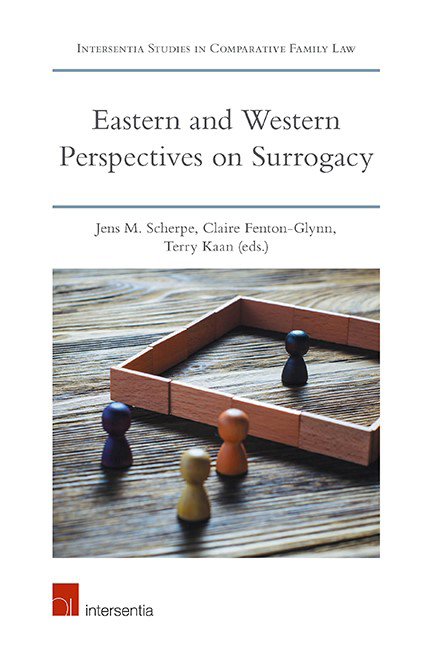Book contents
- Frontmatter
- Preface and Acknowledgements
- Contents
- List of Contributors
- Introduction
- Questionnaire
- PART I WESTERN PERSPECTIVES
- THE PROHIBITIVE APPROACH
- THE TOLERANT APPROACH
- THE REGULATORY APPROACH
- THE FREE MARKET APPROACH
- THE INFLUENCE OF INTERNATIONAL COURTS
- PART II EASTERN PERSPECTIVES
- THE PROHIBITIVE APPROACH
- A TOLERANT APPROACH?
- REGULATION THROUGH PROFESSIONAL MEDICAL BODIES
- Japan
- South Korea
- FROM FREE MARKET TO REGULATION
- PART III COMPARATIVE PERSPECTIVES ON SURROGACY
- Index
- About the Editors
Japan
from REGULATION THROUGH PROFESSIONAL MEDICAL BODIES
Published online by Cambridge University Press: 26 June 2019
- Frontmatter
- Preface and Acknowledgements
- Contents
- List of Contributors
- Introduction
- Questionnaire
- PART I WESTERN PERSPECTIVES
- THE PROHIBITIVE APPROACH
- THE TOLERANT APPROACH
- THE REGULATORY APPROACH
- THE FREE MARKET APPROACH
- THE INFLUENCE OF INTERNATIONAL COURTS
- PART II EASTERN PERSPECTIVES
- THE PROHIBITIVE APPROACH
- A TOLERANT APPROACH?
- REGULATION THROUGH PROFESSIONAL MEDICAL BODIES
- Japan
- South Korea
- FROM FREE MARKET TO REGULATION
- PART III COMPARATIVE PERSPECTIVES ON SURROGACY
- Index
- About the Editors
Summary
INTRODUCTION
Japan has not yet enacted any laws to regulate medically assisted reproduction (‘MAR’). While several guidelines issued by the Japan Society of Obstetrics and Gynecology (‘JSOG’) deal with MAR, including surrogacy, these guidelines are merely self-imposed rules by the JSOG addressed to its members.
Japan also has no laws to specifically regulate the parentage of children born by MAR, but there have been several court cases where issues of such parentage were at stake.
Of course, not all of the cases of MAR raise questions on legal parentage. Some cases can be treated exactly the same way as natural reproduction. For example, artificial insemination with the husband's sperm (‘AIH’) does not cause any specific new legal problems as long as the husband is alive when the artificial insemination is conducted. However, for surrogacy, Japan has faced some difficult issues concerning legal parentage.
JAPANESE LAW OF PARENTAGE IN GENERAL
The Japanese Civil Code was enacted in 1898. Part IV (Family Law) of the Civil Code was drafted under considerable influence of the French Civil Code at that time. Although Pt IV was amended extensively after World War II under the American occupation, particularly in order to introduce new principles such as equality between men and women, the provisions concerning parentage remain fairly untouched. Therefore, Japanese law of parentage has much in common with old French law (i.e. the original French Civil Code). Thus the Japanese Civil Code still retains the distinction between a legitimate child and an illegitimate child.
When a married woman gives birth to a child, legitimate parentage (fatherchild relationship) is automatically established between the woman's husband and the child. Such legitimate parentage can be denied only under very restrictive circumstances. Although there is no relevant provision on the legitimate mother-child relationship in the Civil Code, such a relationship is considered to be automatically established once a married woman has given birth to a child.
When an unmarried woman gives birth to a child, an illegitimate fatherchild relationship is established only by recognition. The father can recognise the child voluntarily or could be forced to recognise the child by a court order.
- Type
- Chapter
- Information
- Eastern and Western Perspectives on Surrogacy , pp. 441 - 448Publisher: IntersentiaPrint publication year: 2019



